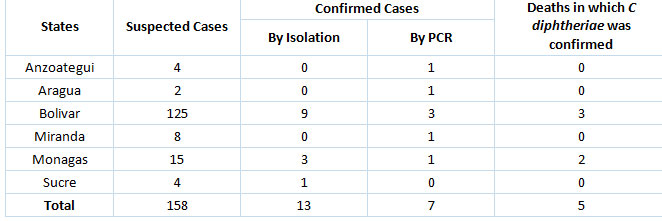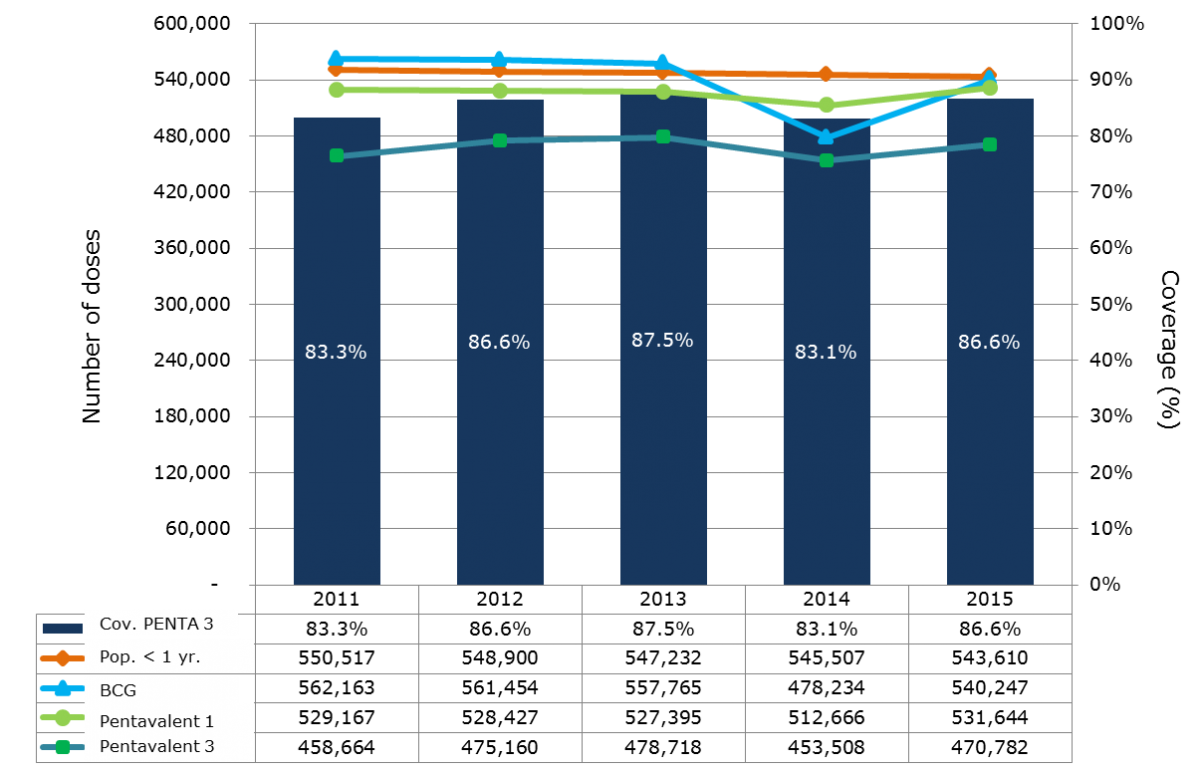On 29 November 2016, the IHR National Focal Point (NFP) of the Bolivarian Republic of Venezuela updated PAHO / WHO on the situation of diphtheria in the country. From the beginning of September to 24 November 2016, 16 of the 24 federal agencies reported suspected or probable cases of diphtheria.
The National Institute of Hygiene "Rafael Rangel" tested a total of 183 samples of suspected and probable cases. Of these, 20 samples resulted positive by isolation of toxin-producing Corynebacterium diphtheriae or by PCR (DNA detection of C. diphtheriae), including five deaths. The confirmed cases were reported from six states (Table 1). All cases are related to gold mines in the state of Bolivar.
Investigation is being conducted into the death of 12 probable diphtheria cases reported from the states of Bolivar and Monagas. To date, C. diphtheriae has been confirmed in five of the fatal cases (three from the state of Bolivar and two from Monagas) and discarded in four cases. Results are still pending for the three remaining deaths. The fatal cases were children aged 8 months to 6 years.
In Bolívar State, suspected cases were reported among people aged 3 months to 60 years. The cases were mostly residents of the municipalities of Sifontes, Caroní, and Heres where 12 cases, including three deaths, have been confirmed. In addition, the two confirmed deaths in the state of Monagas are linked to the state of Bolívar.
In the state of Miranda, suspected cases were reported among individuals aged 3 to 80 years in the the municipalities of Baruta, Chacao, and Tomas Lander. In the state of Monagas, suspected cases were reported among individuals aged 8 months to 62 years.
Prior to the current outbreak, the last laboratory confirmed case of diphtheria in Venezuela was reported in 1992, a single case in Aragua State.
Diphtheria is a vaccine preventable disease caused by exotoxin-producing C. diphtheria, transmitted from person to person through close physical and respiratory contact. It can cause infection of the nasopharynx, which may lead to breathing difficulties and death. Diphtheria is fatal in 5 - 10% of cases, with a higher mortality rate in young children. Treatment involves administering diphtheria antitoxin as well as antibiotics. Vaccination against diphtheria has reduced the mortality and morbidity of diphtheria dramatically.
The occurrence of diphtheria reflects inadequate coverage of the national childhood immunization programme. In the last five years, with the exception of the Bacillus Calmette–Guérin (BCG) vaccine, coverage of the regular vaccination program in Venezuela has not reached 95% with the various vaccines, registering high dropout rates in the Penta1 / Penta3 scheme. Figure 1.
Epidemiological surveillance ensuring early detection of diphtheria outbreaks should be in place in all countries, and all countries should have access to laboratory facilities for reliable identification of toxigenic C. diphtheriae. Adequate quantities of diphtheria antitoxin should be available nationally or regionally for the medical management of cases.
Table 1. Distribution of confirmed cases of diphtheria, Venezuela, September–November 2016.
 |
Figure 1. Vaccination coverage of children under 1 year of age, Venezuela, 2011-2015.
 |
Source: Immunization in the Americas available at: http://www.paho.org/hq/index.php?option=com_content&view=article&id=3573&Itemid=2573&lang=en